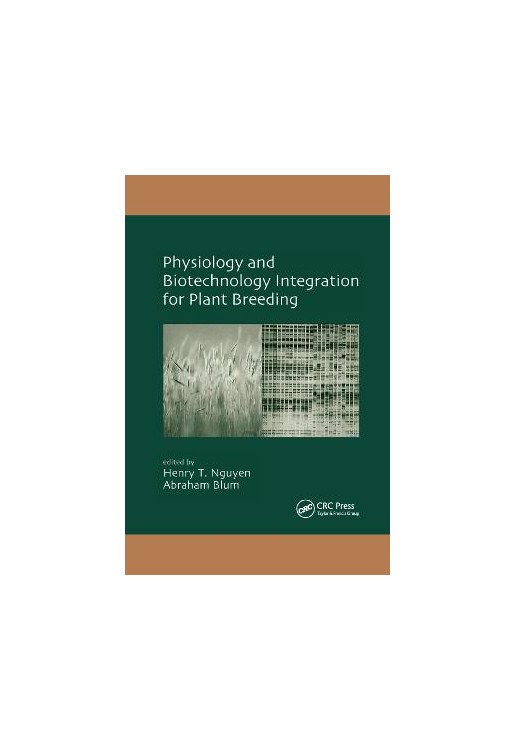Global demand for wheat, rice, corn, and other essential grains is expected to steadily rise over the next twenty years. Meeting this demand by increasing production through increased land use is not very likely; and while better crop management may make a marginal difference, most agriculture experts agree that this anticipated deficit must be made up through increased crop yields. The first resource of its kind, Physiology and Biotechnology Integration for Plant Breeding assembles current research in crop plant physiology, plant biotechnology, and plant breeding that is aimed toward improving crop plants genetically while supporting a productive agriculture ecosystem. Highly comprehensive, this reference provides access to the most innovative perspectives in crop physiology - with a special emphasis on molecular approaches - aimed at the formulation of those crop cultivars that offer the greatest potential to increase crop yields in stress environments.
Surveys the current state of the field, as well as modern options and avenues for plant breeders and biotechnologists interested in augmenting crop yield and stability
With the contributions of plant scientists from all corners of the globe who are actively involved in meeting this important challenge, Physiology and Biotechnology Integration for Plant Breeding provides readers with the background information needed to understand this cutting-edge work, as well as detailed information on present and potential applications. While the first half of the book establishes and fully explains the link between crop physiology and molecular biology, the second part explores the application of biotechnology in the effective delivery of the high yield and environmentally stable crop plants needed to avert the very real possibility of worldwide hunger. "This is the background of this book which offers a form of dialog between the two disciplines, -crop physiology on the one hand and plant biotechnology on the other, indicating the latest findings in this important field. This provides a better understanding towards the goals of agriculture. The book also offers updated information and views on crop physiology and a short summary on the state of the art in genome mapping. ... provides new views for those who commenced working on functional genomics, which will definitely be the major route in the future to eliminate the genotype-phenotype gap and it will become the major method for improving crop productivity for non-adequate environmental conditions, so that agriculture can provide us with high quality foods for the increasing population on our planet. In addition, the book is also a good example of the strong commitment of the Rockefeller Foundation and US - Israel Bi-national Agricultural Research and Development Fund (BARD) to develop future agricultural needs."
-Ervin Balazs, Department of Applied Genomics, Agricultural Research Institute, Hungary, in South African Journal of Botany, Issue 2, 2007
PHYSIOLOGICAL BASIS OF YIELD AND ENVIRONMENTAL ADAPTATION
Physiology of Yield and Adaptation in Wheat and Barley Breeding; J. L. Araus, G.A. Slafer, M.P. Reynolds, and C. Royo
Genetic Yield Improvement and Stress Tolerance in Maize; M. Tollenaar and E.A. Lee
Physiological Basis of Yield and Environmental Adaptation in Rice; S. Peng and A. Ismail
Sorghum Physiology; A. Blum
Pearl Millet; F.R. Bidinger and C.T. Hash
Comparative Ecophysiology of Cowpea, Common Bean, and Peanut; A.E. Hall
The Physiological Basis of Soybean Yield Potential and Environmental Adaptation; T.T. VanToai and J. Specht
The Physiological Basis of Yield and Environmental Adaptation; D. M. Oosterhuis and J. McD. Stewart
APPLICATION OF BIOTECHNOLOGY TO IMPROVE CROP YIELD AND ADAPTATION
Genome Mapping and Genomic Strategies for Crop Improvement; P.K. Subudhi and H.T. Nguyen
Marker-Assisted Utilization of Exotic Germplasm; I. Paran
Heterosis of Yield: Molecular and Biochemical Perspectives; C.W. Stuber
Genetic Engineering for Enhancing Plant Productivity and Stress Tolerance; T.-h.D. Ho and R. Wu
Genome Mapping and Marker-Assisted Selection for Improving Cotton (Gossypium spp.) Productivity and Quality in Arid Regions; Y. Saranga and A.H. Patterson
Molecular Dissection of Abiotic Stress Tolerance in Sorghum and Rice; M. S. Pathan, P.K. Subudhi, B. Courtois, and H.T. Nguyen
Genetic Dissection of Drought Resistance in Maize: A Case Study; J.-M. Ribaut, M. Banziger, T. Setter, G. Edmeades, and D. Hoisington
Physiology and Biotechnology Integration for Plant Breeding: Epilogue; A. Blum and H.T. Nguyen


